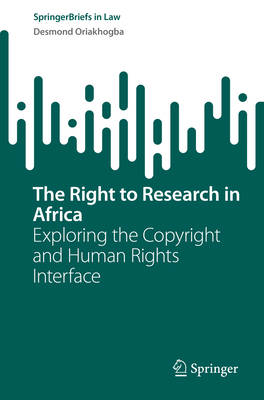
- Afhalen na 1 uur in een winkel met voorraad
- Gratis thuislevering in België vanaf € 30
- Ruim aanbod met 7 miljoen producten
- Afhalen na 1 uur in een winkel met voorraad
- Gratis thuislevering in België vanaf € 30
- Ruim aanbod met 7 miljoen producten
Zoeken
The Right to Research in Africa
Exploring the Copyright and Human Rights Interface
Desmond Oriakhogba
€ 52,95
+ 105 punten
Omschrijving
This book formulates a human right to research in Africa based on an in-depth examination of the available international and regional human rights instruments as well as those relevant to the national contexts of African countries. The imbalances in the African copyright ecosystem regarding access to information for research and education became painfully apparent during the COVID-19 pandemic. African libraries and knowledge curators found themselves ill-equipped to perform their role of enabling access to information. As teaching, learning and research are increasingly done on digital platforms, learners and researchers continue to grapple with the challenges of accessing materials owing largely to the protection of these resources under copyright law. Access to information, which is needed in order to exercise the right to science and culture, faces a significant challenge posed by the exercising of exclusive rights by copyright owners without a legal mechanism that properly balances copyright from a human rights perspective.
To achieve such a balance, there is an urgent need to revise the African copyright system from the perspective of human rights law. Can it be done by establishing a human right to research? In view of the existing broad freedom of expression, and the right to science and culture, education, and property in global, national and regional human rights regimes, is a specific right to research in Africa necessary and justifiable? If so, what should its minimum core components be? Are there international and national regimes already in place that could support the formulation of a human right to research in Africa?
This book offers a valuable resource for law- and policymakers in the fields of copyright and human rights, judges, lawyers, public interest groups, researchers and students, librarians and authors, as well as the general public.
To achieve such a balance, there is an urgent need to revise the African copyright system from the perspective of human rights law. Can it be done by establishing a human right to research? In view of the existing broad freedom of expression, and the right to science and culture, education, and property in global, national and regional human rights regimes, is a specific right to research in Africa necessary and justifiable? If so, what should its minimum core components be? Are there international and national regimes already in place that could support the formulation of a human right to research in Africa?
This book offers a valuable resource for law- and policymakers in the fields of copyright and human rights, judges, lawyers, public interest groups, researchers and students, librarians and authors, as well as the general public.
Specificaties
Betrokkenen
- Auteur(s):
- Uitgeverij:
Inhoud
- Aantal bladzijden:
- 106
- Taal:
- Engels
- Reeks:
Eigenschappen
- Productcode (EAN):
- 9783031332814
- Verschijningsdatum:
- 5/07/2023
- Uitvoering:
- Paperback
- Formaat:
- Trade paperback (VS)
- Afmetingen:
- 156 mm x 234 mm
- Gewicht:
- 185 g

Alleen bij Standaard Boekhandel
+ 105 punten op je klantenkaart van Standaard Boekhandel
Beoordelingen
We publiceren alleen reviews die voldoen aan de voorwaarden voor reviews. Bekijk onze voorwaarden voor reviews.











